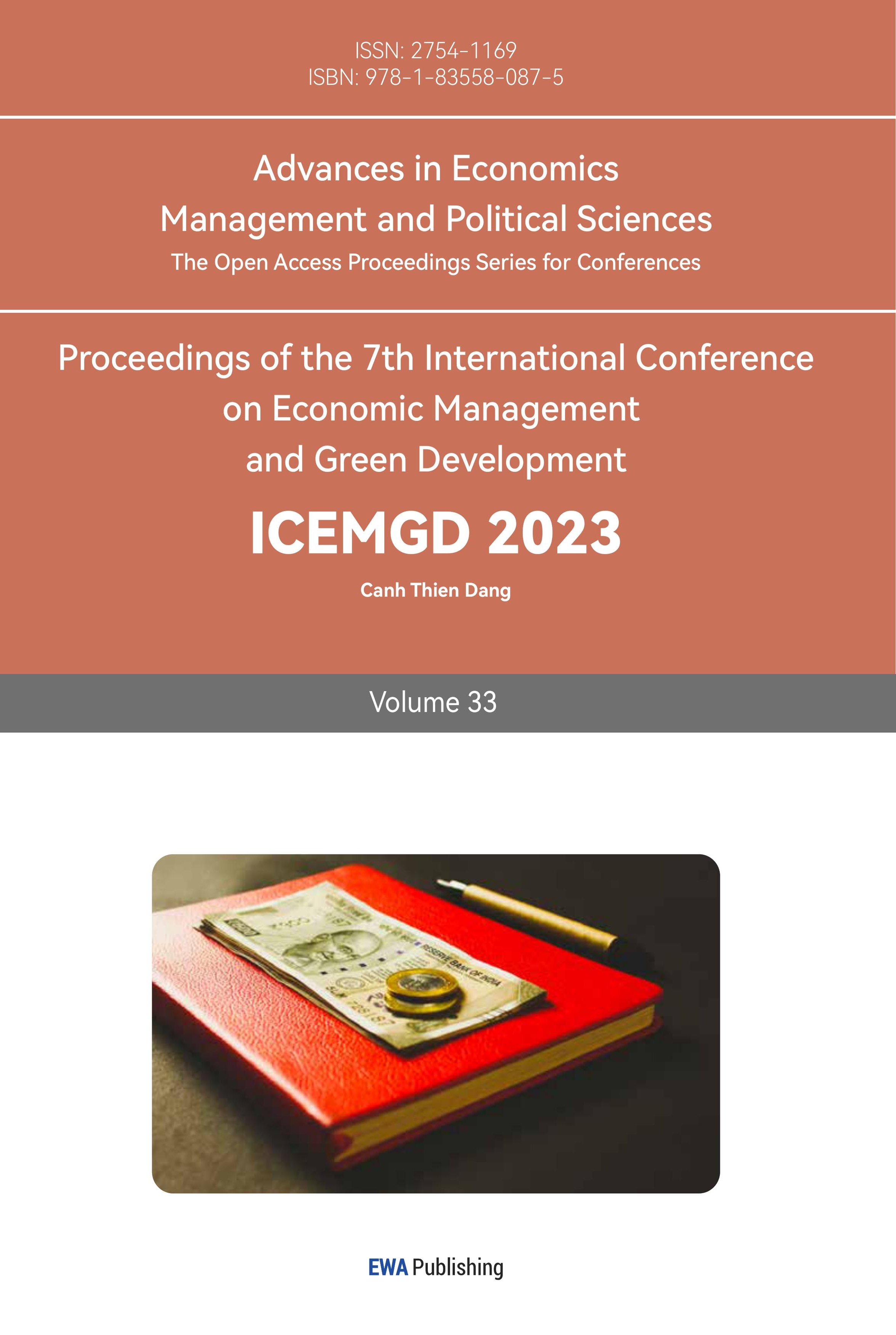References
[1]. Xu, W., Wang, W.: Digital yuan, international economic and trade ties, and macroeconomic volatility. Contemporary Finance and Economics 460(03):55-69 (2023).
[2]. Sang, X.: Exploring the application of digital RMB in the field of green finance. China Price 407(03), 63-66 (2023).
[3]. Christopher, S., Ma, T.: A study on the impact of digital RMB on RMB internationalization. Economic Issues 523(03), 23-29 (2023).
[4]. Wang, W.: Difficulties and points of emphasis in accelerating the orderly development of digital RMB. Economic Journal 447(02),122-128 (2023).
[5]. Wei, D., Peng, S., Zheng, S.: Strategies for commercial banks to use digital RMB intelligent contracts for business development. Financial Technology Times 31(02), 20-26 (2023).
[6]. Shi, Y., Guo, S.: Study on the mechanism of digital RMB enabling RMB internationalization. Journal of Xi’an University of Finance and Economics 36(01),14-28 (2023).
[7]. Yang, S.: International law concerns the evolution of the central bank’s digital currency system. Political Law Series 212(01), 51-64 (2023).
[8]. Ji, Y., Ma, X.: Progress of digital RMB research. Time Finance 828(02), 37-39+46 (2023).
[9]. Liu, W, Su, J.: Macro-control system with Chinese characteristics and macro-control policies - China’s macroeconomic outlook in 2018. Dynamics of Economics 685(03), 4-12 (2018).
[10]. Ali, H., Schinckus, C., Uddin, M., Pahlevansharif, S.: Asymmetric effects of economic policy uncertainty on Bitcoin’s hedging power. Studies in Economics and Finance 40(2), (2023).
Cite this article
Cheng,H. (2023). Central Bank Digital Currency (CBDC) and Its Potential Impact on the Chinese Economy. Advances in Economics, Management and Political Sciences,33,121-127.
Data availability
The datasets used and/or analyzed during the current study will be available from the authors upon reasonable request.
Disclaimer/Publisher's Note
The statements, opinions and data contained in all publications are solely those of the individual author(s) and contributor(s) and not of EWA Publishing and/or the editor(s). EWA Publishing and/or the editor(s) disclaim responsibility for any injury to people or property resulting from any ideas, methods, instructions or products referred to in the content.
About volume
Volume title: Proceedings of the 7th International Conference on Economic Management and Green Development
© 2024 by the author(s). Licensee EWA Publishing, Oxford, UK. This article is an open access article distributed under the terms and
conditions of the Creative Commons Attribution (CC BY) license. Authors who
publish this series agree to the following terms:
1. Authors retain copyright and grant the series right of first publication with the work simultaneously licensed under a Creative Commons
Attribution License that allows others to share the work with an acknowledgment of the work's authorship and initial publication in this
series.
2. Authors are able to enter into separate, additional contractual arrangements for the non-exclusive distribution of the series's published
version of the work (e.g., post it to an institutional repository or publish it in a book), with an acknowledgment of its initial
publication in this series.
3. Authors are permitted and encouraged to post their work online (e.g., in institutional repositories or on their website) prior to and
during the submission process, as it can lead to productive exchanges, as well as earlier and greater citation of published work (See
Open access policy for details).
References
[1]. Xu, W., Wang, W.: Digital yuan, international economic and trade ties, and macroeconomic volatility. Contemporary Finance and Economics 460(03):55-69 (2023).
[2]. Sang, X.: Exploring the application of digital RMB in the field of green finance. China Price 407(03), 63-66 (2023).
[3]. Christopher, S., Ma, T.: A study on the impact of digital RMB on RMB internationalization. Economic Issues 523(03), 23-29 (2023).
[4]. Wang, W.: Difficulties and points of emphasis in accelerating the orderly development of digital RMB. Economic Journal 447(02),122-128 (2023).
[5]. Wei, D., Peng, S., Zheng, S.: Strategies for commercial banks to use digital RMB intelligent contracts for business development. Financial Technology Times 31(02), 20-26 (2023).
[6]. Shi, Y., Guo, S.: Study on the mechanism of digital RMB enabling RMB internationalization. Journal of Xi’an University of Finance and Economics 36(01),14-28 (2023).
[7]. Yang, S.: International law concerns the evolution of the central bank’s digital currency system. Political Law Series 212(01), 51-64 (2023).
[8]. Ji, Y., Ma, X.: Progress of digital RMB research. Time Finance 828(02), 37-39+46 (2023).
[9]. Liu, W, Su, J.: Macro-control system with Chinese characteristics and macro-control policies - China’s macroeconomic outlook in 2018. Dynamics of Economics 685(03), 4-12 (2018).
[10]. Ali, H., Schinckus, C., Uddin, M., Pahlevansharif, S.: Asymmetric effects of economic policy uncertainty on Bitcoin’s hedging power. Studies in Economics and Finance 40(2), (2023).









